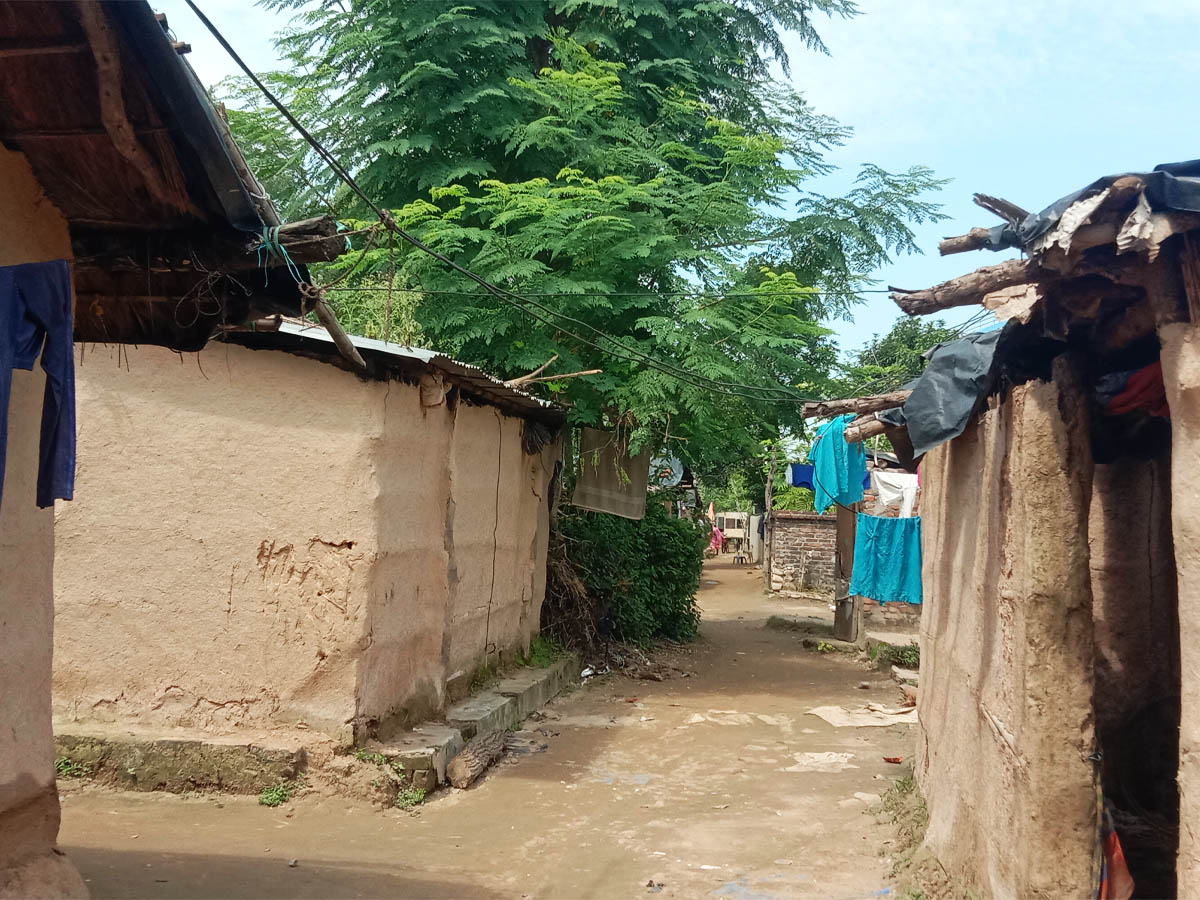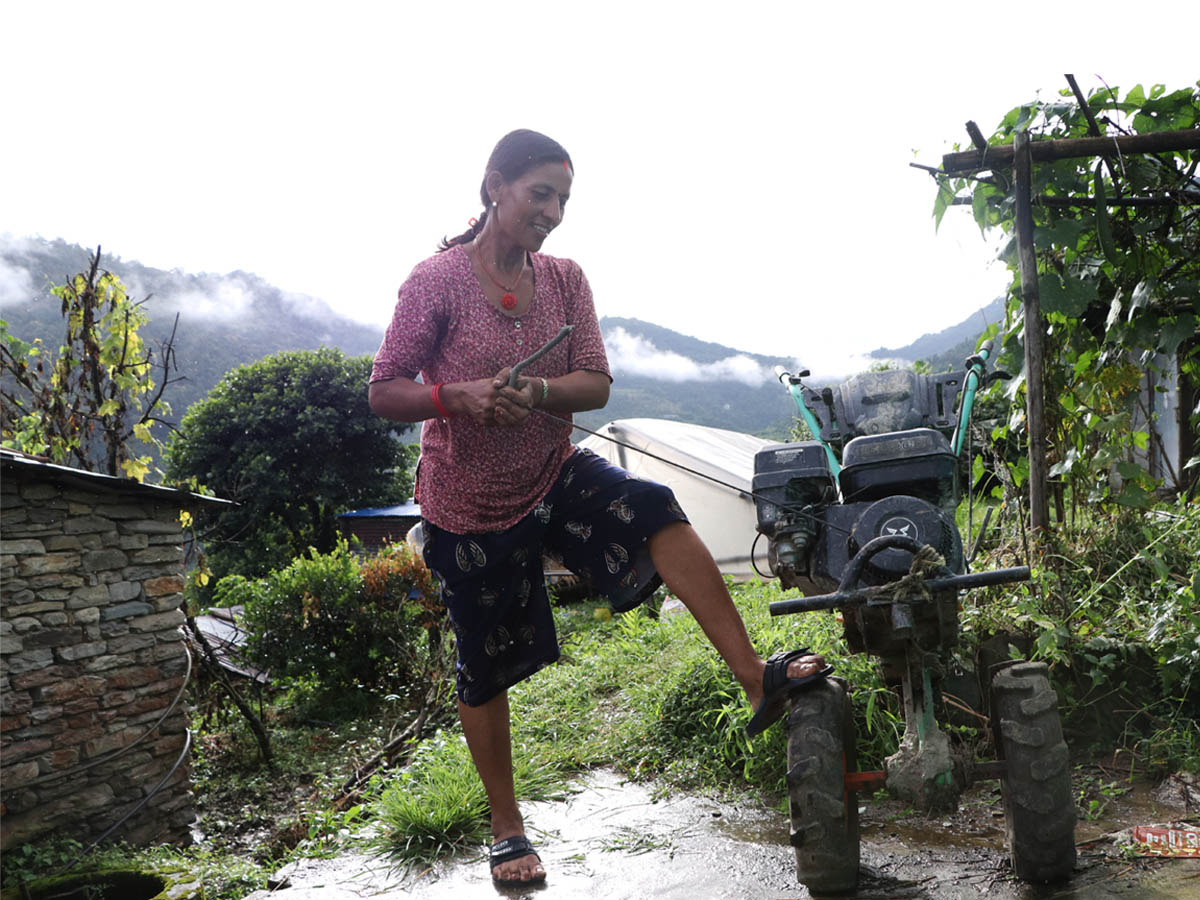Read this in Nepali: कुवेत पुगेका महिला शोषणमा, प्रमाणको अभावमा न्याय पाउन वञ्चित
Harimaya (name changed) from Rupandehi arrived in Kuwait on October 13, 2022 (Ashoj 27, 2079 BS) via Dubai, UAE, for domestic work. She had left for Dubai, paying 250,000 rupees through Roshan Khan, who was originally from India and residing in Butwal, but the agent took her to Kuwait.
 In Kuwait, she endured torture, including repeated rapes, beatings, and being branded with hot rice on her naked body by the house owner where she worked.
In Kuwait, she endured torture, including repeated rapes, beatings, and being branded with hot rice on her naked body by the house owner where she worked.
When she asked to be sent home, saying she could not stay in a foreign country after being raped, Roshan demanded 500,000 rupees, according to Harimaya. She says that after her relatives in Nepal paid 150,000 rupees and agreed to pay the remaining 350,000 rupees upon her return, Roshan brought her back to Nepal two months later, on November 20, 2022 (Mangsir 4, 2079 BS).
After returning home, Harimaya filed a human trafficking case against Roshan in the Rupandehi District Court. The court acquitted Roshan.
Harimaya is among many women facing problems after going abroad for domestic work to support their families. Many women like her have suffered mental and physical torture while working as domestic workers abroad. They have had to pay brokers hundreds of thousands of rupees to go abroad, and when they return prematurely because they cannot work. Due to a lack of evidence, they are also denied justice and compensation.
Phool Kumari (name changed) from Rupandehi, who experienced a similar problem, says, "I suffered more in 40 days than I had in 45 years."
At 45, she went to Kuwait in July/August 2023 (Shrawan, 2080 BS) via Oman from Kathmandu to work as a domestic worker. She flew to Kuwait with money she received after selling her jewelry and taking a loan of 50,000 rupees after a neighboring woman in Kuwait told her, "The work is good; you should come too." She said that an agent named Gyanu from Nepalgunj took 50,000 rupees and sent her to Kuwait.
However, after arriving in Kuwait, she did not receive the promised salary or the promised work. She had understood that she would receive a monthly salary of 120 Kuwaiti Dinars, but upon arrival, she was told she would only receive 90 Kuwaiti Dinars. Still, she accepted this and was willing to work.
She worked only for 15 days at the place she was initially assigned. After that, an agent in Kuwait moved her from one place to another every 15 days for work. After working for only 15 days in one place, she did not receive any salary. "They gave me food at the houses where I worked, but I didn't get anything else," said Phool Kumari.
She says she couldn't even tell her family about the suffering she endured. "They allowed me to talk to my family on the phone, but I had to speak in front of them on a loudspeaker," she said. "I couldn't say anything because I thought if I told them about the hardships, I would suffer even more."
Problem registering cases due to lack of evidence
She was not receiving her salary and had no job security, so Phool Kumari decided to return home. However, the agents there said it would cost 300,000 rupees.
"After I told them that I didn't have that much money and that my family's financial situation was weak so that I couldn't pay, they sent me back to Nepal for 150,000 rupees," she said. She says she was sold and cheated on foreign soil under the pretext of foreign employment and is now worried about how to repay the debt she incurred to go abroad.
After returning to Nepal, she looked for Gyanu, the agent from Nepalgunj who sent her to Kuwait, but could not find her. "I am illiterate; I didn't write down all the names and addresses," said Phool Kumari. "I had met her through a friend, but after returning, I couldn't find her at all."
She also filed a complaint at the District Police Office in Rupandehi after returning to Nepal, but due to a lack of evidence against the fraud and exploitation she suffered, no action could be taken.
In Harimaya's case, Saraswati Pun, Vishnu Pariyar, an Indian citizen named Arman, and Chandra Gurung were also listed as defendants along with Roshan. However, there was no information about them other than their names.
No charge sheet was filed, stating that legal action would be taken when their exact names, surnames, and addresses were disclosed.
The defendant, Roshan, testified that he introduced Harimaya to Arman and that Arman and his associate Chandra Gurung sent her abroad, and later brought her back to Nepal after taking money.
In May/June 2023 (Jestha, 2080 BS), Sanumaya (name changed) from Rupandehi, who had gone to Kuwait for foreign employment, returned to Nepal in three months and four days. Her family also had to pay money to bring her back. However, she could not get justice due to a lack of evidence.
Sanumaya said Raj Thapa of Haraiya, Kanchan Rural Municipality-3, Rupandehi, sent her to Kuwait promising a free visa and ticket but took 30,000 rupees for labor approval.
Although she was told she would have to do domestic work in Kuwait and receive a monthly salary of 110 Kuwaiti Dinars (46,500 rupees), she says she did not get the job and facilities as promised. She said she was only made to work and only got to sleep for two hours for rest.
"After suffering a lot of pain and torture, I didn't want to stay. Even when I said I would rather return to Nepal, they didn't let me come," she said. "The Kuwaitis held me hostage, saying they would only let me go to Nepal if I gave them 250,000 Nepali rupees." She says she returned to Nepal in August/September 2023 (Bhadra, 2080 BS) after her family sent money from Nepal.
She said she could not file a complaint anywhere because she had given the money in cash to the person who sent her to and brought her back from Kuwait, so she had no evidence. Sanumaya said she used to talk to Raj Thapa, who sent her to Kuwait, on the phone, but she has now lost that number and cannot contact him. She also said that she has given up on the expenses of going to and coming from Kuwait. "Thankfully, I came back alive; that was a big deal for me," she said.
According to Deputy Superintendent of Police Laxmi Khanal, many cases of human trafficking are not even registered with the police in Nepal because victims of human trafficking and those affected do not feel safe.
She says that such cases do not reach the concerned bodies due to societal fear, illiteracy, and lack of awareness about the reporting agencies. She says, "Although human trafficking incidents occur, only a small fraction of them reach the police."
According to Khanal, it has been found that not only human trafficking but also human smuggling is equally prevalent in the context of foreign employment. She claims that due to strict enforcement at international airports, people are now going to Gulf countries through Indian border crossings.
Journey to Kuwait via India
Even now, it is found that some women go to third countries via India illegally as domestic workers without labor permits. Chanda (name changed) from Okhaldhunga is one example.
She was rescued from Butwal by employees of the Peace Rehabilitation Home while trying to go to Kuwait via India. "If the Peace Home hadn't rescued me, I don't know where and in what condition I would be today," Chanda said on the phone from her village.
At 22 years old, she was born into an ordinary family. Her family consists of nine members, including her parents. She was looking for work since only her father could earn money, and the family's financial situation was weak. Chanda, who studied up to 12th grade, met Prakash Roka, 32, from Khijidemba Rural Municipality-1, Okhaldhunga, who lived in Thimi, Bhaktapur. Chanda says that after she told Prakash she was looking for work, he had her make a passport, promising to send her abroad.
After the passport was made, Prakash introduced Chanda to Sandhya Khatri Gurung, who is originally from Pokhara Metropolitan City-16, Kaski, and currently resides in Delhi, India, in Kathmandu.
After Sandhya had promised to send her to Kuwait for work, Chanda gave her the passport and 20,000 rupees. A few days later, Sandhya informed Chanda that her visa had arrived.
"They called me to Butwal, Rupandehi, saying that tickets were not available from Kathmandu and that I had to go via India," said Chanda. Sandhya had instructed Chanda to say that she was going to India to take care of her pregnant sister if anyone asked her on the way.
While Chanda was about to go to Kuwait via Delhi, India, on a Nepal-India friendship bus from Butwal, Rupandehi, employees of the Peace Rehabilitation Home became suspicious and questioned her. Nitesh Chaudhary, the head of the Peace Rehabilitation Home in Rupandehi, said that she was rescued after it was revealed during questioning that she was going to Kuwait.
According to Chaudhary, those who go to Gulf countries via India to work as domestic workers are found to travel by bus to India. Employees of the home monitor buses going to India from Butwal and question those suspected, Chaudhary says. Organizations such as the Home, Maiti Nepal, and Afanta Nepal also monitor the trafficking of women and children in the border areas.
After Chanda's rescue, on October 17, 2023 (Ashoj 30, 2080 BS), a human trafficking case was filed against Sandhya and Prakash at the District Police Office, Rupandehi. Deputy Superintendent of Police Suraj Karki of the District Police Office, Rupandehi, informed that both abscond and a search is underway.
In March/April 2017 (Chaitra, 2073 BS), the International Relations and Labor Committee of the then Legislative Parliament directed the government not to send domestic workers until the destination country enacts solid laws regarding domestic workers and enters into bilateral labor agreements with Nepal. After that, the government stopped sending Nepali women as domestic workers.
Harikrishna Neupane, who has been working for the rights and interests of Nepali workers, says that Nepali women workers still go to Gulf countries for work via India or other countries after the government ban on domestic workers.
He says that despite the government ban on going as domestic workers, the number of people going as domestic workers has not decreased. He states that Gulf countries are not good for domestic work because of the need to work 24 hours a day, lack of security, and no one to understand the problems.
Sita Pantha, the district program coordinator of the Safe Migration Resource Center in Rupandehi, says that most women who go to Gulf countries such as Kuwait, UAE, and Oman under the pretext of foreign employment go via India or other countries, so no data or records are available. Those who go illegally without labor permits are more likely to face problems, and the lack of records also creates problems in rescue efforts.
448 people rescued from Kuwait in 10 years
The Migrant Nepali Coordination Committee (PNCC) has been taking initiatives to rescue women who have become stranded in Kuwait while working abroad.
Kul Prasad Karki, an advisor at PNCC, informed that 448 women have been rescued from Kuwait in the last 10 years.
He said that they have found women experiencing problems such as being forced to work for 18 to 22 hours a day, not getting regular food, being beaten for minor mistakes, rape, non-payment of salaries, and being confined inside houses.
(This investigative report was prepared through the NIMJN fellowship supported by the Australian Aid. All rights reserved with the author and publisher.)
Please adhere to our republishing policy if you'd like to republish this story. You can find the guidelines here.



